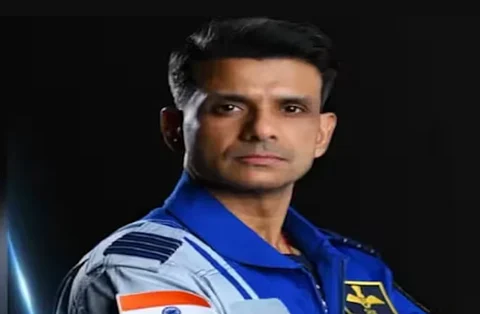
- Home
- Live Blog
- Breaking News
- Top Headlines
- Cities
- NE News
- Sentinel Media
- Sports
- Education
- Jobs

Mowsam Hazarika
(mowsam2000@yahoo.co.in)
India’s space journey has always been one of ambition, perseverance, and growing global stature. From launching indigenous satellites to planning manned space missions, the Indian Space Research Organisation (ISRO) has carved a reputation for frugality coupled with technological precision. Yet, amid all this progress, one historic moment has long loomed large in India’s space consciousness—the flight of Rakesh Sharma in 1984. Now, four decades later, the nation is poised to witness another iconic event. Indian astronaut Shubhanshu Shukla is set to travel to the International Space Station (ISS) in the month of May as part of the Axiom-4 mission, marking a significant milestone not only in India’s space odyssey but also in its growing collaboration with global space agencies and private players.
Union Minister Jitendra Singh’s announcement on April 18, 2025, was more than just a declaration of a forthcoming space mission—it heralded a new era in India’s human space exploration. Shubhanshu Shukla’s upcoming journey to space symbolizes India’s renewed vigour in sending humans beyond Earth’s atmosphere, coinciding with preparations for the country’s indigenous Gaganyaan mission. This moment connects the pride of Sharma’s historic voyage with the futuristic aspirations of a confident, rising India.
Reflecting on the past, Rakesh Sharma’s 1984 mission aboard the Soviet Soyuz T-11 was a watershed in India’s space history. His achievement went beyond being the first Indian in space; it fostered a deep emotional connection with millions. His response to then Prime Minister Indira Gandhi—“Sare Jahan Se Achha”—when asked how India looked from space, remains etched in the nation’s collective memory. It highlighted the possibilities that vision, collaboration, and determination could unlock.
Despite this early breakthrough, India’s participation in manned missions remained dormant for decades. While ISRO achieved remarkable successes in satellite technology, lunar expeditions like Chandrayaan, and planetary missions such as the Mars Orbiter Mission, it refrained from venturing further into human spaceflight, citing budgetary and technological challenges. Only in recent years has this changed, with the ambitious Gaganyaan project rekindling the dream of an Indian human space mission.
Against this backdrop, Shubhanshu Shukla’s upcoming voyage is more than a personal milestone; it represents a crucial bridge between India’s spacefaring legacy and its future self-reliance. The Axiom-4 mission, organized by the private U.S.-based firm Axiom Space, highlights a new global era where governments and private companies collaborate to advance human presence in space. India’s participation in this evolving landscape signals maturity and readiness to be part of the broader international space economy.
As Shukla embarks on his mission, he will engage in scientific research, technical experiments, and real-time adaptation to the challenges of microgravity. Beyond the scientific endeavours, the symbolic value of this journey is immense. For the aspiring youth of India, it reaffirms that becoming an astronaut is no longer a distant dream. For scientists and policymakers, it validates India’s growing capability. And for the world, it announces India’s serious intent to be a key player in the realm of human spaceflight.
Today’s global space environment is strikingly different from the Cold War era. With the rise of China’s Tiangong Space Station, the advent of private players like SpaceX and Blue Origin, and the growing contributions of nations like the UAE and Japan, the space sector is increasingly multipolar. India’s participation in Axiom-4 positions it firmly within this dynamic environment, where space exploration is as much about science and cooperation as it is about national prestige and economic opportunity.
The mission’s timing is particularly significant, given that India’s Gaganyaan programme is progressing steadily. The experience and insights gained through Axiom-4 will be crucial for the success of Gaganyaan, offering real-world exposure to the complexities of human space travel before ISRO launches its own astronauts, or “Vyomanauts”, into orbit aboard an Indian-built spacecraft.
Shubhanshu Shukla himself embodies the spirit of a new India. As a scientist, a trained test pilot, and a dreamer, he represents a generation that is technologically equipped, globally connected, and unafraid to chase ambitious goals. Following in the footsteps of Rakesh Sharma while forging a path uniquely his own, Shukla’s journey is an inspiration for millions.
Yet amidst the celebrations, it is crucial to acknowledge the challenges that lie ahead. Human spaceflight carries inherent risks and demands rigorous preparation, flawless engineering, and unwavering institutional support. As India deepens its investments in space exploration, equal emphasis must be placed on advancing education, research, and private sector engagement. Missions like Axiom-4 should serve as building blocks for sustained and large-scale involvement in space exploration rather than isolated achievements.
In the end, Shubhanshu Shukla’s forthcoming flight stands as a moment of immense pride and limitless promise. It encapsulates India’s journey from the historic echoes of Rakesh Sharma’s achievement to a future where Indian astronauts venture to the Moon, Mars, and beyond. As the countdown begins, the eyes of a billion people will once again look skyward—not just to witness a spacecraft ascend but to feel the collective rise of a nation that dares to dream among the stars.